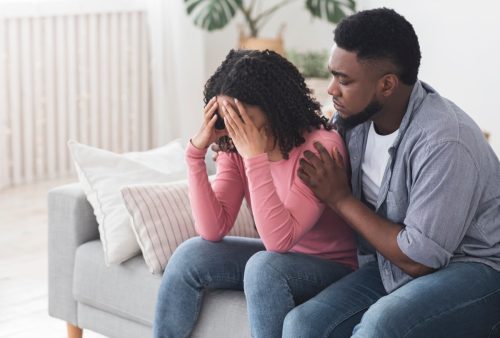20 Relationship Red Flags You Should Never Ignore
Whether you're newly dating or have been together for years, don't ignore these warning signs.

There's no getting around the fact that relationships aren't easy. First, you've got to find someone you connect with and set up a date to see if there's a spark. From there, it gets even trickier. After spending time together, you need to decide if that person is someone you'd like to continue seeing or if y0u'd rather keep looking for a better match. Making this choice is sometimes difficult—although it can be easier when certain red flags are present. To help you know what what warning signs indicate that your relationship is doomed (or bound to make you unhappy), we've consulted therapists about the red flags you should never ignore. Read on to save yourselves years of agony with an incompatible partner.
RELATED: 8 Red Flags That Signal Cheating, Therapists Warn.
What Is a Relationship Red Flag?
The term "red flag" applies to any behavior that could lead to a toxic dynamic within your relationship. The idiom can be traced back to the 18th century when actual red flags were deployed during battle to signal danger or a need to halt. Ships flying these banners were known to show "no quarter," or no mercy, and railways would use them as a sign to stop.
While not all red flags are capable of destroying a relationship, they do need to be addressed. Even minor issues can balloon into major points of contention between you and your partner. It's also important to understand the full spectrum of red flags out there. We should all recognize that controlling behavior and communication issues can weigh on a relationship, but little things like poor eye contact or a string of stories concerning "crazy" exes could spell trouble, as well.
20 Red Flags to Look for in a Relationship
1. All of their exes are somehow "crazy."

If you meet someone who only has negative things to say about every ex, consider it a red flag. It's not like you need to look back at all your past relationships fondly, but if your partner isn't able to come up with something nice to say about a single one, then it begs the question: Is it the exes, or are they the common denominator in a string of unsuccessful relationships? "It can be a situation in which your partner is rewriting history and always blaming others," says Marisa T. Cohen, PhD, marriage and family therapist. "If this is the case, the person isn't acknowledging the part they play in the relationship."
2. They don't have much of a social circle.

If your new partner is somewhat of a lone wolf, that could be cause for concern. Jessica Harrison, a licensed professional counselor and owner of Courageous Counseling and Consulting, says a lack of long-term friendships is a huge red flag. "It shows that they have not been committed to growing in relationships, which takes time and effort on both friends' part," says Harrison. "People change over time and part of being in a long-term friendship means accepting your friends and friendship as it redefines itself throughout the lifecycle." If they haven't practiced this in a friendship, they might struggle to do it in a romantic relationship.
It is possible to move forward with someone who doesn't have long-term friendships. Harrison simply recommends ensuring you don't become detached from your own social circle while you do it. "Many people who do not have positive, long-term friendships in their lives will request, suggest, or demand that you also release some of your friendships," she warns. "Do not make this tragic mistake." Your friends are your support system, and you should ditch anyone who wants you to ditch them.
3. They're rushing the relationship forward way too fast.

This is actually a pretty common red flag to see during the early stages of a new relationship. Younger people might refer to this practice as "love bombing," which is a term for someone showering you with affection and attention. Of course, enthusiasm in a new relationship is always appreciated. However, some abusers use love bombing to manipulate their partners, confusing them into accepting mistreatment. Too much attention too fast could quickly devolve into dependent behaviors down the line, and that opens the door to plenty of other toxic dynamics.
4. They're trying to change you.

The right partner will accept you as you are, while the wrong partner may do the opposite. "One of the biggest red flags in a relationship is when you find you are becoming involved with someone who wants to change the way you behave, speak, dress, interact with others, live, or spend your time," says Monica Vermani, clinical psychologist and author of A Deeper Wellness. "Someone who wants to change you essentially does not want the real you, they want their version of the perfect partner—and they're willing to train, disparage, and manipulate an individual into becoming their perfect partner."
5. Your relationship goals don't align.

This is another one of those common red flags that tend to pop up at the beginning of a newly formed romantic relationship. While it's normal not to rush into "the talk," it is important to eventually outline your relationship goals. According to Cohen, avoiding the subject could signal that they want something a lot more casual than what you may have been hoping for.
RELATED: 206 Questions to Ask Your Crush to Learn Who They Really Are.
6. You never fight.

Screaming profanities at your significant other is not OK, but if you never disagree at all, it may be a red flag. "When couples say they don't fight, I always consider this a sign that the relationship is not as strong as you might think," says Nicole Rainey, licensed mental health counselor and founder of Mosaic Creative Counseling, LLC. "Avoiding conflict or disagreements isn't the sign of a healthy relationship and couples that say they don't fight often mean they each keep things stuffed down and don't communicate their issues out loud." When their true feelings are stifled, resentment can grow.
7. They're showing signs of substance abuse.

Some may consider evidence of substance abuse a yellow flag—i.e. a reason to be cautious rather than to end the relationship right away. For others, it may be a deal breaker. "It's tricky," says Cohen. "It may be a red flag for someone if they have had substance use issues themselves or have supported a loved one through their journey with substance use." Going through the motions again with a new partner might be too much of a trigger for some people.
That said, a partner's addiction struggles don't necessarily have to tank the relationship. "This in and of itself isn't necessarily a problem," she adds. "The person may actively be working on ways to manage their substance use and seek appropriate help."
8. You're hiding your doubts about the relationship.

Be honest: Do you think your person is the one? If your inner voice says no, it's a major red flag. "People can have recurring thoughts of doubt that they downplay in their mind and don't openly share because they think it is their own problem and something they need to figure out," says Matthew Brace, LMFT, who works with couples at Therapy Embraced. "Within the relationship, things may seem fine, but one partner may be preoccupied with unwanted thoughts of doubt and feeling stuck on what to do." When these thoughts go unaddressed, it can lead to a disconnect within the relationship.
To improve this issue, the partner with doubts must fess up—and the other partner must take it in stride. "If someone shares their doubts and their partner responds in a reassuring and understanding way, it will strengthen the relationship," Brace says. "However, if someone shares their thoughts of doubt and their partner responds critically, it will likely create distance in the relationship and potentially confirm the assumptions of doubt."
9. You don't have deep conversations.

Your first date will likely be filled with small talk and banter. But if you don't begin to develop emotional intimacy as you continue to see a new person, it could be a red flag. "As the relationship progresses, there should be discussions about all of the hard topics—religion, politics, money, emotions," says Dana Torpey-Newman, a licensed clinical psychologist who specializes in couples therapy. "These should be real conversations where differences are identified and examined." While discussing these topics early can't guarantee you won't face disagreements down the road, "you greatly increase the probability of moving in a connected way through these events if you have shared values and perspectives on life," she says.
10. Your friends and family don't want to spend time with them.

Usually, friends and family members have only our best interests in mind, so it's a pretty big deal for them not to want to spend time with your partner. According to Cohen, an openly hostile relationship between your partner and other people close to you may indicate larger issues at play. Not only that, but the longer the issue persists, the more likely you are to become alienated from your own support network. Conflict resolution and compromise are two important components of a relationship. Refusing to participate in either of these processes for the sake of bettering your connection is a major red flag.
RELATED: How Do You Know You Love Someone? Look for These 16 Telltale Signs.
11. They avoid eye contact.

If you feel like you haven't looked your partner in the eyes in weeks, that could be cause for concern. "As a general rule, humans engage in eye contact with people they feel closer to or are attracted to," says David Helfand, PsyD, licensed psychologist and owner of Life Wise. "If you notice your partner is avoiding eye contact it might mean something is happening beneath the surface that needs to be addressed."
You can also ask yourself the same question: Am I avoiding eye contact and why?
Helfand says this issue can be resolved through eye gazing. "Many couples feel closer to each other spending even just a few minutes two to five days per week looking into each others' eyes," he explains, noting that this can happen during sex, or simply when you're sitting on the couch together after work. "It is a powerful way to rebuild a connection with a loved one and can have profound effects on the relationship and each person's individual well-being," he adds.
12. You assume they would never do something.

It can be as simple as assuming your partner would never skydive or as serious as assuming they'd never cheat or walk out. "If a person believes their partner would 'never' do or think this or that, it means they might have an idea of their partner instead of seeing them as a whole, complex person," says Alli Spotts-De Lazzer, licensed marriage and family therapist. "Further, that kind of thinking can cause a person to miss both subtle and overt signs due to their own mindset."
To fix this issue, stop making assumptions. "Even a thought-revision to 'I don't believe my partner would X' can help," says Spotts-De Lazzer. "For a relationship to be authentically strong, we need to see each other in realistic ways instead of idealistic ideas about who a person is."
13. They're bad at communication.

Communication is an absolute must in a relationship. An inability to communicate openly and with understanding allows even the smallest miscommunications to balloon into something much worse. Talking things out is important for your own sanity, too. Think about it. Has bottling things up ever actually helped matters? If anything, it just leads to more resentment down the line.
Of course, not everyone has an easy time opening up about their feelings, and communication can take different forms. However, it is important to find some method of connecting to resolve any issues that might arise.
14. You feel more yourself when they aren't around.

"Strong relationships are often a source of comfort," says Allison Raskin, author of Overthinking About You: Navigating Romantic Relationships When You Have Anxiety, OCD, and/or Depression. "If you feel like you are having to walk on eggshells or overthink your behavior when you are with your significant other, that can be a signal that you aren't a safe space for each other."
This doesn't mean your relationship is necessarily doomed to fail, however. "Sometimes periods of disconnection happen in long-term relationships and you can re-find that connection through vulnerable (and maybe uncomfortable) conversations, or by spending more quality time together," Raskin tells Best Life. "Think about what other people do to make you feel comfortable and heard and then, if your partner is lacking in these areas, maybe initiate a discussion about what you can both do to make things better."
15. They are unwilling to compromise.

Every relationship takes compromise. But who is accommodating whom? If it's always you who's stepping back, it could be a sign of a toxic relationship. "While flexibility is a strength, compromise should be a two-way street. But sometimes couples get locked in a dynamic where one partner is always the one to give in in order to keep the peace," says Raskin.
"If you find that you are the only one who ever compromises (from big to small issues), it is worth trying to stand your ground about something and see how your partner reacts," she suggests. "Maybe you have just been folding too quickly to give them the chance to step up, or maybe you will learn that they are incredibly stubborn and unwavering. Either way, you want to try to break the cycle so there is more balance and less room for resentment to build."
16. They act up when you spend time away from them.

Any attempt to alienate you from other relationships is a red flag, plain and simple. Healthy relationships should nurture each partner's independence. You should be able to do things for yourself, tend to your own needs, and be happy spending time with others, even when your partner isn't around.
If your partner has a problem with that, then you may need to reexamine your dynamic. "A person who acts up when you spend time away from them may be trying to control you and limit your social support access to others," says Cohen.
RELATED: 228 Questions to Ask a Girl During Your Next Date.
17. Your gut tells you something is off.

Sometimes, a negative gut feeling is the most telling red flag—even if you can't pinpoint the issue. "If you have a feeling of caution about the person you're dating, don't ignore it," says Michael Ceely, licensed marriage and family therapist and owner of Ceely Counseling. "That's your own personal red flag, and it's trying to tell you something."
David Helfand, a licensed psychologist specializing in couples therapy, agrees. "The human gut has an entire nervous system called the enteric nervous system," he says. "It helps us tune into very subtle awareness, but because it lacks a cortex, it does not have language or discrete consciousness." However, he notes that the body can react and send us messages long before our conscious mind makes sense of a situation. So, if your gut is telling you something, listen up—it could be the biggest red flag of them all.
18. Their quirks no longer seem cute.

It's normal to occasionally get annoyed by your partner. Everyone has quirks, and they aren't always adorable. But you shouldn't spend the majority of your time together feeling irritated by your partner's presence. An inability to embrace their idiosyncrasies may indicate that there's a more substantial problem within the relationship. Really think about what's bothering you—and why.
19. They have issues with anger management.

Your partner being unable to control themselves during an argument is one of those warning signs that should not be ignored.
"Poor self-regulation can lead to poor relationships," says Cohen. It's normal for couples to have conflict from time to time, but it's also imperative to practice conflict resolution in a way that leaves everyone feeling validated—and, even more importantly, safe.
RELATED: How to Know if a Girl Likes You? 12 Signs That Say She's Interested.
20. Any kind of physical, verbal, or emotional abuse.

Abusive behavior is a step above a red flag. It's a reason to walk away from a relationship immediately.
We all make compromises for our partners, but your health and wellbeing should never be at stake. If you feel unsafe within your relationship, reach out and get support—whether that's through family and friends, a professional source, or both.
Abuse doesn't take just one form, either. Emotional neglect, verbal mistreatment, and financial abuse are just a few methods by which abusers may seek to control their partners. If any of this sounds familiar to you, make a plan to remove yourself from the situation as quickly as possible.
Wrapping Up
That's it for our list of relationship red flags, but be sure to check back in with us soon for more relationship advice. You can also sign up for our newsletter to enjoy similar content, as well as the latest in wellness, entertainment, and travel.





















